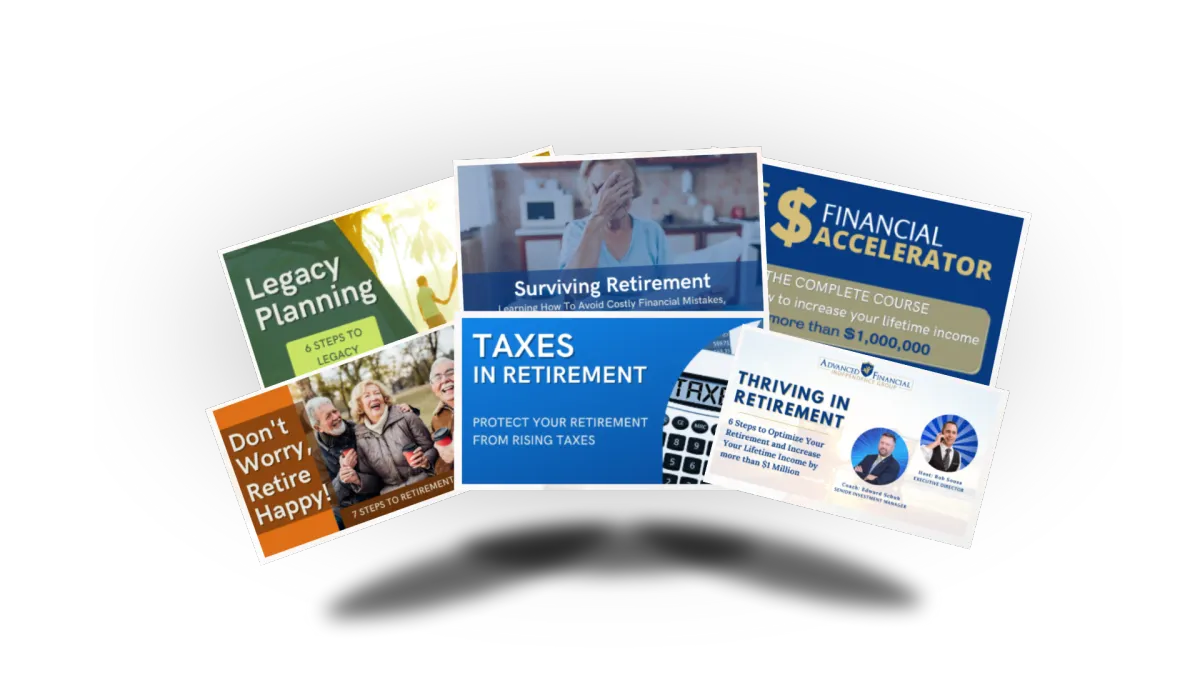Operation Retirement Freedom
The Exclusive Resource Vault
for Financial Freedom
SECURE YOUR FUTURE, DEFEND YOUR LEGACY

Tactical Strategies for Financial Freedom, Since 1979
Our online courses offer:
Expert Guidance: Learn from seasoned professionals dedicated to your financial success.
Comprehensive Strategies: Gain insights into retirement optimization, tax reduction, estate planning, and more.
Flexible Learning: Access courses anytime, anywhere, at your own pace.
Actionable Steps: Implement practical solutions tailored to your financial goals.
Operation Retirement Freedom
The Exclusive Resource Vault for Financial Freedom
SECURE YOUR FUTURE, DEFEND YOUR LEGACY

Tactical Strategies for Financial Freedom, Since 1979
Our online courses offer:
Expert Guidance: Learn from seasoned professionals dedicated to your financial success.
Comprehensive Strategies: Gain insights into retirement optimization, tax reduction, estate planning, and more.
Flexible Learning: Access courses anytime, anywhere, at your own pace.
Actionable Steps: Implement practical solutions tailored to your financial goals.
Why are people signing up?
Why are people signing up?
Masterclasses
"Master the Art of Wealth Protection, Tax Reduction, and a Secure Retirement."
Equip yourself with the strategies needed to defend your wealth, minimize taxation, and retire with confidence.
Masterclasses
"Master the Art of Wealth Protection, Tax Reduction, and a Secure Retirement."
Equip yourself with the strategies needed to defend your wealth, minimize taxation, and retire with confidence.
Weekly Broadcasts
"Mission-Ready Strategies for Taxes, Wealth Protection & Secure Retirement."
Your go-to show for expert strategies on maximizing retirement income and minimizing tax burdens.
Weekly Broadcasts
"Mission-Ready Strategies for Taxes, Wealth Protection & Secure Retirement."
Your go-to show for expert strategies on maximizing retirement income and minimizing tax burdens.
Movies and Documentaries
"Award-Winning Documentaries on Wealth, Taxes & Legacy Protection."
Watch gripping films and hard-hitting documentaries that uncover the financial challenges every American faces.
Movies and Documentaries
"Award-Winning Documentaries on Wealth, Taxes & Legacy Protection."
Watch gripping films and hard-hitting documentaries that uncover the financial challenges every American faces.
Blog Articles
"Defend Your Assets. Minimize Taxes. Secure Your Legacy."
Stay ahead with expert articles, in-depth analysis, and actionable strategies to protect your financial future.
Blog Articles
"Defend Your Assets. Minimize Taxes. Secure Your Legacy."
Stay ahead with expert articles, in-depth analysis, and actionable strategies to protect your financial future.

10 Common Retirement Mistakes and How to Avoid Them
Retirement should be the golden years of your life, a time to relax and enjoy the fruits of your hard work. However, even with the best intentions, many retirees make costly mistakes that can jeopardize their financial security. Here are 10 common retirement mistakes, why they happen, their consequences, and how you can avoid them to enjoy a stress-free retirement.
________________________________________
1. Failing to Create a Retirement Income Plan
Why It Happens:
Many retirees enter retirement without a clear understanding of how much income they need or where it will come from.
Consequences:
Without a structured income plan, you risk running out of money too soon or not living the retirement you envisioned.
Solution:
Create a comprehensive retirement income plan that accounts for expenses, inflation, and income sources like Social Security, pensions, and investments. Work with a financial planner if needed to ensure you’re on track.
________________________________________
2. Claiming Social Security Too Early
Why It Happens:
Retirees often fear that Social Security benefits will run out or feel pressured to claim as soon as they’re eligible.
Consequences:
Claiming early reduces your lifetime benefits by up to 30%.
Solution:
Delay claiming Social Security to maximize your benefits. Use tools or consult with an expert to determine the optimal age based on your circumstances.
________________________________________
3. Underestimating Healthcare Costs
Why It Happens:
Many people mistakenly believe Medicare covers all healthcare costs.
Consequences:
Facing unexpected out-of-pocket costs can derail your retirement budget.
Solution:
Budget for healthcare, including premiums, deductibles, and long-term care expenses. Consider supplemental insurance or a Health Savings Account (HSA) if applicable.
________________________________________
4. Ignoring Inflation
Why It Happens:
Retirees often rely on fixed income sources and forget about the rising cost of living.
Consequences:
Inflation erodes your purchasing power, leaving you financially stressed in later years.
Solution:
Invest in growth-oriented assets and periodically review and adjust your budget to stay ahead of inflation.
________________________________________
5. Not Diversifying Income Streams
Why It Happens:
Relying too heavily on one income source, such as Social Security, leaves retirees vulnerable.
\Consequences:
If that income source changes, it could disrupt your financial stability.
Solution:
Develop multiple income streams, including rental income, dividends, or annuities, to reduce your financial risk.
________________________________________
6. Neglecting Tax Planning
Why It Happens:
Retirees focus on gross income without considering how taxes impact their net income.
Consequences:
Higher tax bills reduce the amount of money available for your expenses.
Solution:
Engage in proactive tax planning, such as Roth conversions or tax-efficient withdrawal strategies. Work with a tax advisor to minimize liabilities.
________________________________________
7. Overspending Early in Retirement
Why It Happens:
Retirees often splurge on travel or hobbies without considering the long-term impact.
Consequences:
Depleting savings early can lead to financial insecurity later in retirement.
Solution:
Create a realistic budget and adhere to a sustainable withdrawal rate, such as the 4% rule.
________________________________________
8. Failing to Update Estate Plans
Why It Happens:
Procrastination or the assumption that estate planning is only for the wealthy.
Consequences:
Family disputes, unnecessary taxes, and assets being distributed against your wishes.
Solution:
Regularly review and update your will, trusts, beneficiaries, and powers of attorney to ensure they align with your current wishes and legal requirements.
________________________________________
9. Underestimating Longevity
Why It Happens:
Many retirees plan for a shorter lifespan based on outdated assumptions.
Consequences:
You risk outliving your savings and becoming financially dependent on others.
Solution:
Plan for at least 30 years of retirement, factoring in inflation and rising healthcare costs.
________________________________________
10. Taking Too Much or Too Little Investment Risk
Why It Happens:
Some retirees become too conservative, while others chase high returns without considering the risks.
Consequences:
Either strategy can result in losses or insufficient growth to sustain your income.
Solution:
Assess your risk tolerance and align your portfolio with your goals. Rebalance regularly to maintain the right mix of assets.
________________________________________
Final Thoughts
Retirement is one of life’s most significant transitions, and avoiding these common pitfalls can make all the difference. Take the time to plan, stay informed, and seek professional guidance to secure the retirement you’ve always dreamed of.
Ready to Take Action?
Action Items:
Create a Retirement Income Plan: Identify your monthly expenses, list all income sources, and factor in inflation and unexpected costs.
Analyze Social Security Options: Use a Social Security calculator or consult an expert to determine the best claiming age for your situation.
Budget for Healthcare: Include premiums, deductibles, and potential long-term care costs in your financial plan.
Review and Adjust Investments: Ensure your portfolio aligns with your risk tolerance and includes growth assets to combat inflation.
Diversify Income Streams: Explore additional sources of income, such as annuities, rental properties, or part-time work.
Plan for Taxes: Work with a tax advisor to develop strategies like Roth conversions and tax-efficient withdrawals.
Set a Budget and Withdrawal Strategy: Create a realistic spending plan and stick to a sustainable withdrawal rate (e.g., 4%).
Update Your Estate Plan: Review wills, trusts, and beneficiaries regularly to ensure they reflect your wishes.
Plan for Longevity: Prepare for at least 30 years of retirement, factoring in rising costs and healthcare needs.
Consult a Financial Professional: Schedule a meeting with a fiduciary advisor to review your overall plan and address any gaps.

10 Common Retirement Mistakes and How to Avoid Them
Retirement should be the golden years of your life, a time to relax and enjoy the fruits of your hard work. However, even with the best intentions, many retirees make costly mistakes that can jeopardize their financial security. Here are 10 common retirement mistakes, why they happen, their consequences, and how you can avoid them to enjoy a stress-free retirement.
________________________________________
1. Failing to Create a Retirement Income Plan
Why It Happens:
Many retirees enter retirement without a clear understanding of how much income they need or where it will come from.
Consequences:
Without a structured income plan, you risk running out of money too soon or not living the retirement you envisioned.
Solution:
Create a comprehensive retirement income plan that accounts for expenses, inflation, and income sources like Social Security, pensions, and investments. Work with a financial planner if needed to ensure you’re on track.
________________________________________
2. Claiming Social Security Too Early
Why It Happens:
Retirees often fear that Social Security benefits will run out or feel pressured to claim as soon as they’re eligible.
Consequences:
Claiming early reduces your lifetime benefits by up to 30%.
Solution:
Delay claiming Social Security to maximize your benefits. Use tools or consult with an expert to determine the optimal age based on your circumstances.
________________________________________
3. Underestimating Healthcare Costs
Why It Happens:
Many people mistakenly believe Medicare covers all healthcare costs.
Consequences:
Facing unexpected out-of-pocket costs can derail your retirement budget.
Solution:
Budget for healthcare, including premiums, deductibles, and long-term care expenses. Consider supplemental insurance or a Health Savings Account (HSA) if applicable.
________________________________________
4. Ignoring Inflation
Why It Happens:
Retirees often rely on fixed income sources and forget about the rising cost of living.
Consequences:
Inflation erodes your purchasing power, leaving you financially stressed in later years.
Solution:
Invest in growth-oriented assets and periodically review and adjust your budget to stay ahead of inflation.
________________________________________
5. Not Diversifying Income Streams
Why It Happens:
Relying too heavily on one income source, such as Social Security, leaves retirees vulnerable.
\Consequences:
If that income source changes, it could disrupt your financial stability.
Solution:
Develop multiple income streams, including rental income, dividends, or annuities, to reduce your financial risk.
________________________________________
6. Neglecting Tax Planning
Why It Happens:
Retirees focus on gross income without considering how taxes impact their net income.
Consequences:
Higher tax bills reduce the amount of money available for your expenses.
Solution:
Engage in proactive tax planning, such as Roth conversions or tax-efficient withdrawal strategies. Work with a tax advisor to minimize liabilities.
________________________________________
7. Overspending Early in Retirement
Why It Happens:
Retirees often splurge on travel or hobbies without considering the long-term impact.
Consequences:
Depleting savings early can lead to financial insecurity later in retirement.
Solution:
Create a realistic budget and adhere to a sustainable withdrawal rate, such as the 4% rule.
________________________________________
8. Failing to Update Estate Plans
Why It Happens:
Procrastination or the assumption that estate planning is only for the wealthy.
Consequences:
Family disputes, unnecessary taxes, and assets being distributed against your wishes.
Solution:
Regularly review and update your will, trusts, beneficiaries, and powers of attorney to ensure they align with your current wishes and legal requirements.
________________________________________
9. Underestimating Longevity
Why It Happens:
Many retirees plan for a shorter lifespan based on outdated assumptions.
Consequences:
You risk outliving your savings and becoming financially dependent on others.
Solution:
Plan for at least 30 years of retirement, factoring in inflation and rising healthcare costs.
________________________________________
10. Taking Too Much or Too Little Investment Risk
Why It Happens:
Some retirees become too conservative, while others chase high returns without considering the risks.
Consequences:
Either strategy can result in losses or insufficient growth to sustain your income.
Solution:
Assess your risk tolerance and align your portfolio with your goals. Rebalance regularly to maintain the right mix of assets.
________________________________________
Final Thoughts
Retirement is one of life’s most significant transitions, and avoiding these common pitfalls can make all the difference. Take the time to plan, stay informed, and seek professional guidance to secure the retirement you’ve always dreamed of.
Ready to Take Action?
Action Items:
Create a Retirement Income Plan: Identify your monthly expenses, list all income sources, and factor in inflation and unexpected costs.
Analyze Social Security Options: Use a Social Security calculator or consult an expert to determine the best claiming age for your situation.
Budget for Healthcare: Include premiums, deductibles, and potential long-term care costs in your financial plan.
Review and Adjust Investments: Ensure your portfolio aligns with your risk tolerance and includes growth assets to combat inflation.
Diversify Income Streams: Explore additional sources of income, such as annuities, rental properties, or part-time work.
Plan for Taxes: Work with a tax advisor to develop strategies like Roth conversions and tax-efficient withdrawals.
Set a Budget and Withdrawal Strategy: Create a realistic spending plan and stick to a sustainable withdrawal rate (e.g., 4%).
Update Your Estate Plan: Review wills, trusts, and beneficiaries regularly to ensure they reflect your wishes.
Plan for Longevity: Prepare for at least 30 years of retirement, factoring in rising costs and healthcare needs.
Consult a Financial Professional: Schedule a meeting with a fiduciary advisor to review your overall plan and address any gaps.
Events
"Maximize Wealth: Exclusive Events"
Join expert-led events on tax strategies, investing, and wealth protection.
Events
"Maximize Wealth: Exclusive Events"
Join expert-led events on tax strategies, investing, and wealth protection.
DISCLAIMER:
The content is developed from sources believed to be providing accurate information. The information in this material is not intended as tax or legal advice. Please consult legal or tax professionals for specific information regarding your individual situation. Some of this material was developed and produced by FMG Suite to provide information on a topic that may be of interest. FMG Suite is not affiliated with the named representative, broker - dealer, state - or SEC - registered investment advisory firm. The opinions expressed and material provided are for general information, and should not be considered a solicitation for the purchase or sale of any security.
We take protecting your data and privacy very seriously. As of January 1, 2020 the California Consumer Privacy Act (CCPA) suggests the following link as an extra measure to safeguard your data: Do not sell my personal information.
Life insurance & annuity services provided by Advanced Financial, Steve Sousa CLU, CA License#0476190
Brian Walker CA License #0H13310 | Jessica Markworth CA License #0E56830 | Jill Sousa CA License # 0L05626
Securities investment services provided by Inception Financial Services with advisory services offered through AlphaStar Capital Management.


















